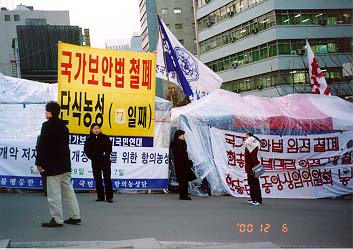- TOP
- 資料館
- FOCUS
- December 2000 - Volume 22
- Human Rights in Korea
FOCUS December 2000 Volume 22
Human Rights in Korea
Korean NGOs recently launched a new hunger strike to protest the failure of the Korean government to repeal the National Security Law and to enact a law creating an independent national human rights institution. An appeal to the international community was made by the Korean NGOs on the occasion of the ceremony awarding President Kim Dae-jung the Nobel Peace Prize in Oslo, Norway last December 11, 2000.
On November 27 to 29, 2000, a three-day sit-in protest was held by the Korean NGOs in front of the Myongdong Catholic cathedral in Seoul. The protest attracted a lot of media attention. Then starting on December 1, 2000, the 52nd anniversary of the National Security Law, a dozen leading activists of the National Solidarity for Abolition of NSL started a new hunger strike. They demand the immediate repeal of the law.
The Korean NGOs state the problem in the following manner:
[The] National Security Law has been used to oppress . .. dissident[s] for 52 years. The number of people in South Korea punished under the National Security Law has never . .. decreased under the Kim Dae-Jung government in comparison with the past. [The] National Security Law is a major obstacle to the full realization of . .. human rights enshrined in [the] Universal Declaration [of Human Rights] and International Covenant on Civil and Political Rights. Therefore, [the UN] Human Rights Committee expressed its grave concern regarding the continued existence and application of the National Security Law and recommend[ed its repeal. ]
President Kim has [said] that "the National Security Law will be revised in accordance with the changing situation of [the] times. " However, there has been no change. President Kim and the ruling party seem to have no will of revising or repealing the National Security Law. We urge the government to abolish the National Security Law immediately. "1
The Korean NGOs believe that the Inter-Korean Summit of June 15, 2000 provides President Kim with a reason for the repeal of the National Security Law. They demanded at that time, at least, the repeal of parts of the law that restrict freedom of expression on those matters considered to benefit "enemy states. " But the government seems to have lost interest on repealing the law. And the ruling party seems to be waiting for a peace treaty between North and South Korea before a repeal of the law is made. Since the government has not taken steps to negotiate the peace treaty, the repeal of the law will take years before it happens. The current efforts by the ruling party (through its Special Committee for the Improvement of Human Rights) to come up with human rights legislations are unsatisfactory to the Korean NGOs.

[ Anti-NSL hunger strike in Seoul ]
There is no chance for the repeal of the law to occur within year 2000. The National Assembly closed its regular session on December 9, 2000.
The Korean NGOs argue that the continuing existence of the National Security Law threatens anyone who dissents from government policies.
The failure to enact a law establishing an independent national human rights institution symbolizes the resistance of government to be exposed to effective monitoring of its human rights record. As the Korean NGOs put it
When Kim Dae-Jung took office in February 1998, we welcomed the commitments he made to strengthen human rights protection and to establish a national human rights commission. National human rights institutions play a key role in the protection and promotion of human rights but it is vital that such institutions are independent, fully empowered and enjoy the trust and confidence of civil society. However, the government has tried to establish a weak and ineffective human rights institution and doesn't care [about] human rights NGOs' rightful demand. 3 years passed without any progress. We criticize [the] lack of transparency [in drafting the bill on the commission] and neglect of the government [in completing the task]. .. .. we strongly urge the government to establish a commission which is fully independent, empowered and has a broad mandate.
President Kim, in his speech during the Nobel Peace Prize awarding ceremony in Oslo, pledged that he will "give the rest of my life to human rights and peace in my country. .. "2 President Kim is being challenged to live up to this commitment.
For further information, contact: Sarangbang Group for Human Rights, ph (822) 741-53-63; fax (822) 741-53-64; e-mail: humanrights@sarangbang. or. kr
Endnotes
- "Korean Human Rights Activists are currently on hunger strike!" Article sent via e-mail by Sarangbang Group for Human Rights (humanrights@sarangbang.or.kr), ph (822) 741-5363
- "Kim makes rights vow as he gets Nobel," The Japan Times, December 12, 2000.
